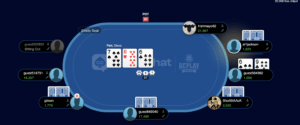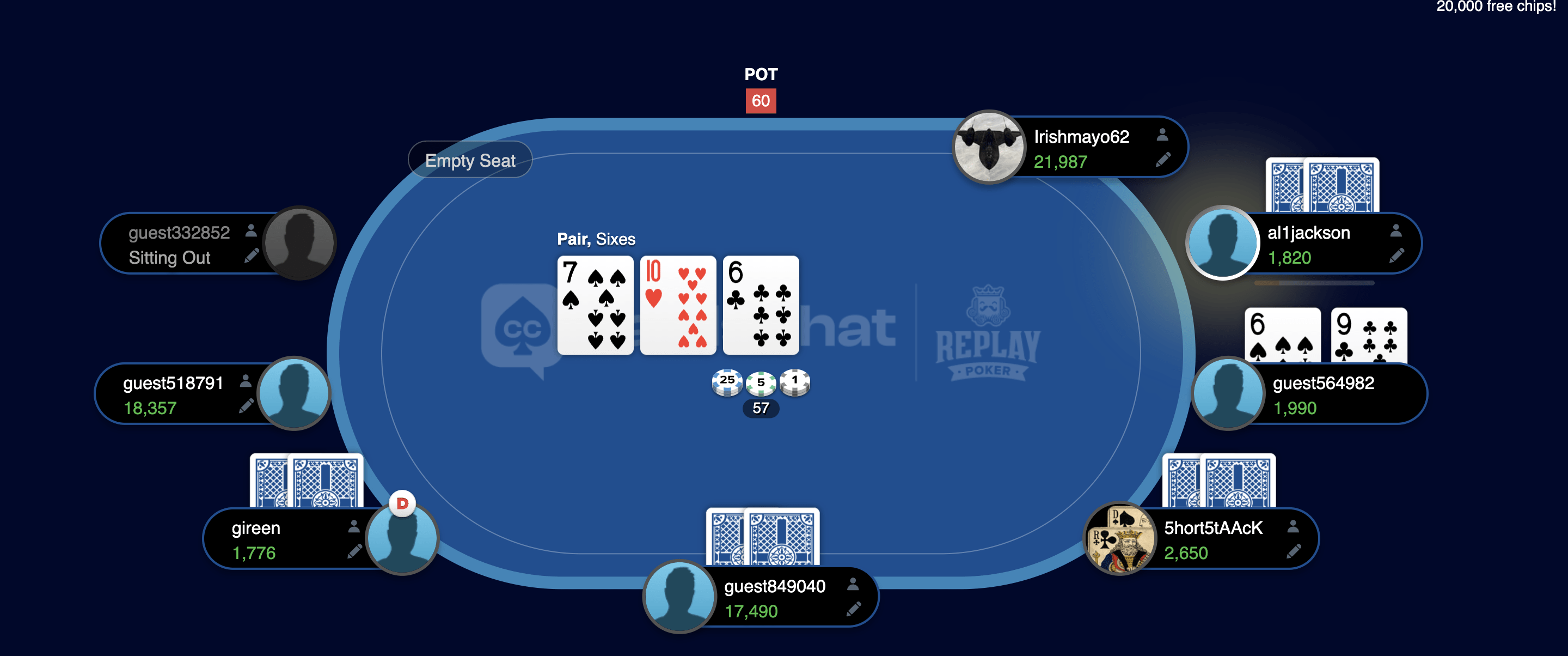For my critical play analyzing games of chance, I chose to play online poker. I’m a casual poker player at best, but many of my friends have a weekly poker game that has fascinated me for some time now. I’m curious about the game’s draw and the nature of its skill curve. However, I am most intrigued by how the online poker format creates ground for addiction by exploiting psychology similar to other chance-based games: The illusion of control, social dynamics, and randomness.
From my observations and experiences, online poker can put people at significant risk for addiction. Unlike pure games of chance like slot machines, poker involves a skill component that gives players a sense of control. The game has been extensively studied and modeled mathematically in terms of probability distributions, so players are able to generate strategies that are profitable in expectation. This is a double-edged sword, as a ‘skillful’ player’s quantitative analysis of the game creates an illusion of control that is a powerful driver of addictive behavior. Players often believe that by honing their skills or studying their opponents, they can improve their chances of winning. However, the inherent randomness of the game means that no amount of skill can completely eliminate the role of ‘luck.’

The loading screen of the online poker site displays probability tips to players.
I played a couple of hands online as part of this critical play. Despite not being a gambler, I noticed this illusion of control having an immediate effect on me. During one round, I had a strong hand and made a sizable bet, confident that my play was skillful and would lead to a win with high probability. However, a player with a weaker hand caught a lucky card on the river, winning the pot. Despite the frustration, I kept playing, convinced that my next hand would be different – after all, that’s what the numbers aid. This cycle of near-misses and the occasional win kept me engaged for far longer than needed, illustrating how the interplay of skill and luck can trap players in a continuous loop.

Compared to slot machines, which the“Designing Chance” document describes as meticulously engineered to keep players engaged, online poker uses similar psychological tactics but in a different format. Slot machines utilize variable ratio reinforcement schedules, where rewards are unpredictable, to create a compulsion loop. Online poker does the same but adds the element of skill, which can make the game even more engaging and harder to walk away from. The near-miss effect is also present in poker. Losing with a strong hand or folding only to see that you would have won if you had stayed in the game, mirrors the near-miss scenarios in slot machines that keep players spinning the reels.
Additionally, the social aspect of online poker, where you play against other people rather than a machine, adds another layer of complexity. The desire to outplay real opponents and the social validation that comes with winning can be powerful motivators. This is only amplified by the option to integrate social media accounts, rewards for inviting friends, and further incentives that all serve to reinforce the retention rate of the game. These social elements can lead to prolonged playing sessions, as players seek both monetary rewards and social recognition.
Finally, randomness in poker is a major factor in addiction through the creation of unpredictable outcomes. Over many rounds, players experience variance in their hand results. This phenomenon is coupled with the individual belief that clever assessment of probabilities and playstyles give a players the ability to influence the game. I noticed that this resulted in a potent mix – in the games I played, some players chased losses, perhaps believing that their next hand would turn their luck around. It was fascinating to observe the parallel between this chase and the same psychological mechanisms described in “Designing Chance,” where the anticipation of a win can be as compelling as the win itself.
In conclusion, online poker’s combination of skill and chance, the illusion of control, and the social dynamics involved make it particularly addictive. Like other games of chance, it leverages randomness to keep players engaged, but it also adds unique elements that enhance its addictive potential. Understanding these dynamics is crucial for recognizing the risks and developing strategies to mitigate addiction in online poker and similar games.




